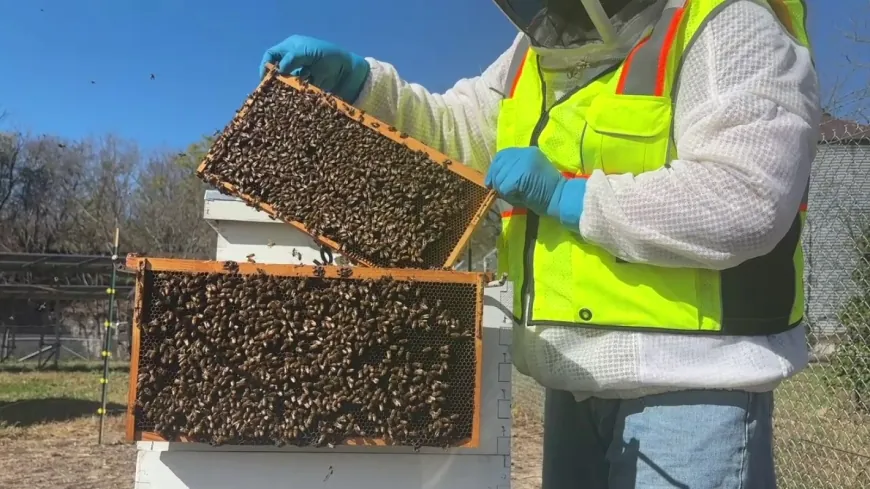‘They are critical to our world’s food supply’: Dominion Energy pilot program brings thousands of honeybees to Virginia

BUCKINGHAM COUNTY, Va. (WRIC) -- Dominion Energy has started a pilot project that puts beehives on solar farms, intending to both increase the honeybee population and benefit local farming and food production in surrounding areas.
The only solar farm to have beehives installed so far is Black Bear Solar in Buckingham County. Over 180,000 bees have been there since August.
“They are critical to our world’s food supply," said Dominion Energy spokesperson Tim Eberly.
For the last year, Dominion has been looking for ways to pair solar farms with surrounding farms with food or crops. This is known as agrivoltaics.
“The primary purpose of this pilot project is to help increase the pollinator population," Eberly said.
The vetting process involved in putting bees somewhere is complex. Dominion has to make sure no farms within a three-mile radius use man-made chemicals that could harm the bees. They also have to make sure that they aren’t competing for food with other pollinators.
Black Bear Solar, a solar farm that spans 13 acres of land and is equipped with 4,400 solar panels, passed the test. With 15 years of beekeeping experience and 200 beehives across the state, Dominion vetted his solar farm and knew it was meant to “bee.”

Black Bear Solar in Buckingham County, equipped with four beehives as part of Dominion Energy's new pilot program. (Photos: 8News)

Black Bear Solar in Buckingham County, equipped with four beehives as part of Dominion Energy's new pilot program. (Photos: 8News)

Black Bear Solar in Buckingham County, equipped with four beehives as part of Dominion Energy's new pilot program. (Photos: 8News)

Black Bear Solar in Buckingham County, equipped with four beehives as part of Dominion Energy's new pilot program. (Photos: 8News)

Black Bear Solar in Buckingham County, equipped with four beehives as part of Dominion Energy's new pilot program. (Photos: 8News)

Black Bear Solar in Buckingham County, equipped with four beehives as part of Dominion Energy's new pilot program. (Photos: 8News)
Four hives with 45,000 bees each were installed in August under the care of beekeeper Chuck Burden.
“I think the coolest part is ensuring the survival and doing education," Burden said.
He provides that education not only to the community -- but to farmers, as well. Burden equips them with responsible farming habits.
“They’ve got a business," Burden said. "They’ve got a crop to bring in and [they] marry the bees in with that.”
The bees stay within a three-mile radius, flying out of the hive each day to pollinate.
“Without the honeybees, there wouldn’t be any blueberries," Burden said.
This is an example specific to Virginia -- but there also wouldn’t be coffee, almonds, apples or any berries without bees, just to name a few.
Dominion said it doesn't want to stop this pilot program here.
“If all goes well, by spring, we’ll have eight beehives," Eberly said. "We’ve got an empty bench with room for four more.”
Burden said that, contrary to popular belief, bees do not hibernate during these colder months. They maintain their hives, eat the honey they’ve stored up and keep the queen bee warm at 94 degrees. He said he even sells some of the excess honey the bees won’t need.

 VENN
VENN 





